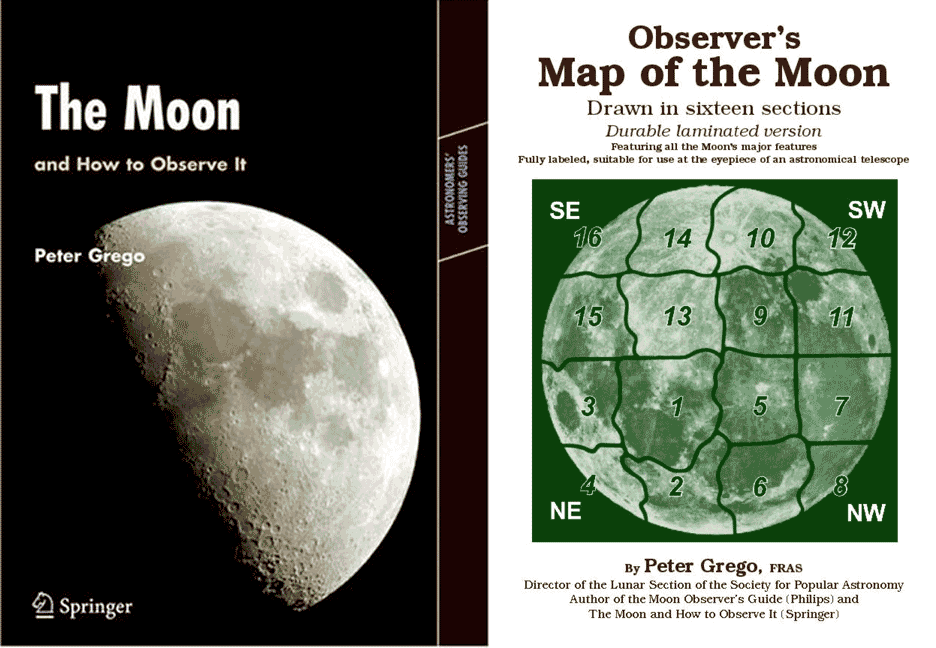|
|
| (4 intermediate revisions by the same user not shown) |
| Line 1: |
Line 1: |
| | __NOTOC__ | | __NOTOC__ |
| | =Two by Grego= | | =Two by Grego= |
| | + | <!-- Start of content --> |
| | <div class="post" id="post-125"> | | <div class="post" id="post-125"> |
| | | | |
| Line 6: |
Line 7: |
| | <p>[[File:Grego-TheMoon.gif|Grego books]]<em>books by [mailto:petergrego@lineone.net Peter Grego]</em></p> | | <p>[[File:Grego-TheMoon.gif|Grego books]]<em>books by [mailto:petergrego@lineone.net Peter Grego]</em></p> |
| | <p>Who is the most prolific author of Moon books? For the last 50 years it would be Patrick Moore, but recently it is Peter Grego, who published the handy [[May_19,_2004|<i>Moon Observer’s Guide (MOG)</i>]] in 2004, and <i>The Moon and How to Observe It (MHOI)</i> and <i>Observer’s Map of the Moon (OMM)</i> in 2005. The wonderful thing about these books is they are full of useful advice for observers. Lets cover <i>OMM</i> first. It is spiral bound with 16 maps, very similar to those in <i>Hatfield Photographic Lunar Atlas</i> except on a pale green background made from an out of focus full Moon image. This helps distinguish highland from mare areas but doesn’t add info in the highlands. These maps – without the green color – are also published in <i>MHOI.</i> What is the difference between the two books? <i>MOG</i> is 192 small pages and describes the Moon day by day through the lunation. MHOI is 274 larger pages that describe the Moon according the 16 sections shown on the cover of <i>OMM.</i> <i>MHOI</i> provides a little more info about each lunar feature and more photos and drawings of them. <i>MHOI</i> corrects some of the errors in the earlier book and is for more serious observers. If you want a book to give to someone to encourage interest in the Moon make it <i>MOG</i>; if you read LPOD and want a more comprehensive guide, buy yourself <i>MHOI</i>.<br /> | | <p>Who is the most prolific author of Moon books? For the last 50 years it would be Patrick Moore, but recently it is Peter Grego, who published the handy [[May_19,_2004|<i>Moon Observer’s Guide (MOG)</i>]] in 2004, and <i>The Moon and How to Observe It (MHOI)</i> and <i>Observer’s Map of the Moon (OMM)</i> in 2005. The wonderful thing about these books is they are full of useful advice for observers. Lets cover <i>OMM</i> first. It is spiral bound with 16 maps, very similar to those in <i>Hatfield Photographic Lunar Atlas</i> except on a pale green background made from an out of focus full Moon image. This helps distinguish highland from mare areas but doesn’t add info in the highlands. These maps – without the green color – are also published in <i>MHOI.</i> What is the difference between the two books? <i>MOG</i> is 192 small pages and describes the Moon day by day through the lunation. MHOI is 274 larger pages that describe the Moon according the 16 sections shown on the cover of <i>OMM.</i> <i>MHOI</i> provides a little more info about each lunar feature and more photos and drawings of them. <i>MHOI</i> corrects some of the errors in the earlier book and is for more serious observers. If you want a book to give to someone to encourage interest in the Moon make it <i>MOG</i>; if you read LPOD and want a more comprehensive guide, buy yourself <i>MHOI</i>.<br /> |
| − | <b>COMMERCIAL:</b> Both <i>MOG</i> and <i>MHOI</i> can be ordered from Amazon thru LPOD, and LPOD will make a small commission! So if you want to buy either – or any other lunar book I recommend – visit the LPOD [http://www.lpod.org/?page_id=102 bookstore]. Thanks! </p> | + | <!-- Removed reference to store page 2 --> |
| − | <p>[mailto:tychocrater@yahoo.com Chuck Wood]</p>
| + | </p> |
| | <p><strong>Related Links:</strong><br /> | | <p><strong>Related Links:</strong><br /> |
| | [http://www.lunarobservers.com/ Peter’s webpage]<br /> | | [http://www.lunarobservers.com/ Peter’s webpage]<br /> |
| Line 13: |
Line 14: |
| | <p><b>Yesterday's LPOD:</b> [[March 4, 2006|Twin Peaks]] </p> | | <p><b>Yesterday's LPOD:</b> [[March 4, 2006|Twin Peaks]] </p> |
| | <p><b>Tomorrow's LPOD:</b> [[March 6, 2006|A Forgotten Corner]] </p> | | <p><b>Tomorrow's LPOD:</b> [[March 6, 2006|A Forgotten Corner]] </p> |
| − | <p align="center"><b>REALLY SUPPORT LPOD - VISIT A SPONSOR (CLICK AN AD BELOW)!</b></p> | + | <!-- Remove click bait --> |
| − | <p><b>Yesterday's LPOD:</b> [[March 4, 2006|Twin Peaks]] </p>
| |
| − | <p><b>Tomorrow's LPOD:</b> [[March 6, 2006|A Forgotten Corner]] </p>
| |
| | </div> | | </div> |
| − | ----
| + | <!-- End of content --> |
| − | ===COMMENTS?===
| + | {{wiki/ArticleFooter}} |
| − | Register, and click on the <b>Discussion</b> tab at the top of the page.
| |
| − | <hr>
| |
| − | <!-- | |
| − | You can support LPOD when you buy any book from Amazon thru [[Support_ LPOD|LPOD]]!
| |
| − | -->
| |
| − | <span style="font-size:88%">
| |
| − | <center>
| |
| − | Contributions to http://www2.lpod.org/ are licensed under a Creative Commons Attribution No-Derivative-Works Non-Commercial 3.0 License. [http://www.creativecommons.org/licenses/by-nc-nd/3.0 http://www.wikispaces.com/i/creativecommons/by-nc-nd_3.0_80x15.png]<br>
| |
| − | </center>
| |
| − | </span>
| |
 books by Peter Grego
books by Peter Grego


